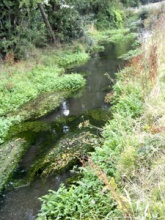Case study:LARA (Lugg and River Arrow)
Project overview
| Status | Complete |
|---|---|
| Project web site | http://www.wyeuskfoundation.org/projects/lara.php |
| Themes | Fisheries, Habitat and biodiversity, Water quality |
| Country | England, Wales |
| Main contact forename | Stephen |
| Main contact surname | Marsh-Smith |
| Main contact user ID | |
| Contact organisation | Wye & Usk Foundation |
| Contact organisation web site | http://www.wyeuskfoundation.org/ |
| Partner organisations | |
| Parent multi-site project | |
| This is a parent project encompassing the following projects |
No |
Project summary
In 2008 the Foundation secured funding from the SITA Trust's Enriching Nature Programme for a £194,000 lower Lugg and Arrow project. The trust was set up to manage sums from SITA's landfill tax and has used this to support actions under Entrust's DA (Biodiversity) measure.
With support from the Lugg & Arrow Fisheries Association (LAFA) and from the Wye Salmon Fisheries Owners Association (WSFOA), LARA will improve the biodiversity in the Lugg and Arrow within 10 miles of Leominster's licensed land fill site. In 2007 salmon, trout and the habitat "rivers and streams" were added to the UK Biodiversity Action Plan (BAP). These, plus brook and river lamprey, bullhead, otter, a wide range of invertebrates (inc. crayfish), grey wagtail, kingfisher, dipper and sand martin will benefit from the project.
The project has 3 main areas of activity:
• Riverline habitat restoration
• Fish passage
• Improving water quality
The project began with baseline surveys including a macrophyte (plants that live in or near water) survey.
Habitat Restoration
The project will focus on fencing out the most damaged of the tributaries in the area. These include: Pinsley; Tippets; Broad; Aston; Curl and Wellington brooks; and the river Arrow.
In addition to this, a sequential 3-year work plan has been developed for 1.2km of the main stem of the Lugg at Mortimer's cross. The first stage of this involved re-establishment of ranunculus and increasing the cover on the banks. 580m was completed in September 2009. Also, a new site of 2.4km of main stem on the Arrow at Monkland was coppiced and the willow laid into the banks.
Monitoring surveys and results
Lessons learnt
Image gallery
|
Catchment and subcatchment
Site
Project background
Cost for project phases
Reasons for river restoration
Measures
MonitoringHydromorphological quality elements
Biological quality elements
Physico-chemical quality elements
Any other monitoring, e.g. social, economic
Monitoring documents
Additional documents and videos
Additional links and references
Supplementary InformationEdit Supplementary Information
| ||||||||||||||||||||||||||||||||||||||||||||||||||||||||||||||||||||||||||||||||||||||||||||||||||||||||||||||||||||||||||||||||||||||||||||||||||||||||||||||||||||||||||||||||||

